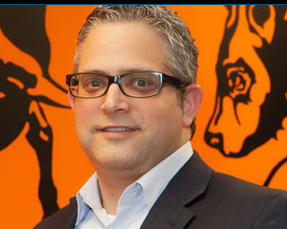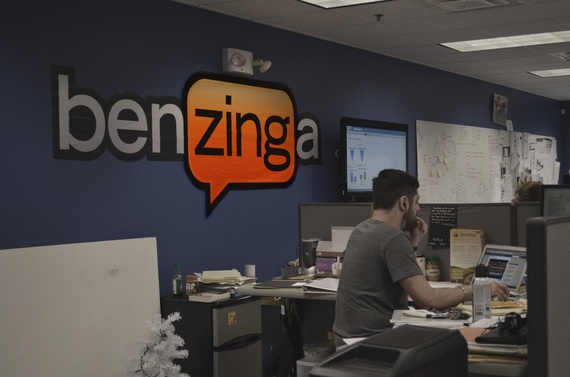By Wayne Lam and Adam Ludwig
In anticipation of our Techonomy Detroit conference on September 16, we are profiling Detroit-area tech startups that are driving the city's re-emergence as a center of innovation. (To register for the conference, click here.)
(Jason Raznick)
When Jason Raznick set out to create an online financial service to help the average investor, he didn't gravitate to New York City's center of global finance. He launched it from his basement in Birmingham, Michigan. Recognizing the need for a service that delivers quality investment information to people who don't have a Wall Streeter's access to real-time data, he figured his hometown was as good a place as any to get started. Having built a sizable following with his writing about small-cap and defense stocks in the early 2000s, Raznick formed Benzinga to provide news, educational resources, and a community platform to regular investors. Now operating in Detroit, Benzinga continues to grow its audience as the rise of community-based, social investing continues to transform the industry. Techonomy spoke with Raznick about Benzinga's evolution, and why Detroit's can-do attitude makes it a great setting for digital startups.
What does Benzinga offer its users?
We want to help people understand what investing is. It's crazy that schools teach health and nutrition, but they don't teach you about finance. Benzinga groups content and education together to make investing fun and successful for the average investor.
When you go on Benzinga you will see a link to Marketfy, an educational platform that has content, a newswire, and thought leaders. So if you want to learn what a 401K is, there is an expert platform for you.
How has investing changed with the rise of social media, and how has that impacted your business?
It is totally social. We crowdsource experts. Instead of social investing, I call it DIY investing. It is really about empowerment. Before, if you wanted information like a company's earnings report, the guys on Wall Street had it first. We created our own newswire to deliver news to everyone else at the same time. Marketfy uses the wisdom of the crowd to help educate people about certain types of investor problems. The experts are around the world. They don't necessarily need a Harvard degree. An expert can be someone who specializes in real estate trusts. They are on our platform. The rise of social has really spurred the growth for Benzinga and Marketfy in a way that wouldn't have happened five years ago.
Pro is more targeted towards active traders. We have a real-time news desk of people talking to CEOs of companies and breaking stories in real time. People use it to keep abreast of the stock market.
(Benzinga Offices)
How do you see Benzinga's services evolving?
Product subscriptions are the biggest part of our business and growing the fastest. We used to be a content-only business, but we are now really a content and software company. With superior information, data, and tools, we give our readers the edge needed to profit in the markets. We might expand to other verticals, but we are really focused now on trying to find talented developers, product managers, people who have that fire in them.
Do you try to attract talent from outside of Detroit?
We are in the finance space. Where are those guys? Chicago and New York. So we attract them here and we are going to continue to do that. The environment and the affordability here is among the best. So we do find people out of state and get them here.
We have to go where the opportunity is and where the talent presents itself. But overall there is a great culture right here, and more startups need to come here to build on top of this. We could move the company to New York, but I think there is more of a focused culture here. There is really a strong work ethic.
What has the funding trajectory for the company been?
Some of our investors include some of the guys who started Groupon and Lightbank. It was self-funded for a while and then the guys from Groupon invested $1.5 million a few years ago. We turned profitable 6 months ago. We are going from there, investing in the company, and continuing to grow.
What do you like about having a business in Detroit?
There is no hierarchy. If you are a doer you can be successful. It is really an important philosophy to me. In Detroit, the more the doers don't listen to the hierarchy, the more success they will have. Startups are hard. You wake up and think, "Am I going to have a paycheck the next morning?" Anxiety is always there. But you have to learn to go through walls.
In Detroit as a whole, I see that brightness. I see action happening. I think we are going to see a very different horizon in three years. When I say horizon, I mean companies will be in Fortune and the Crain's 100 list. We will be there. If we aren't, I'll make sure 10 other companies are. I really want others to be empowered to build stuff. There is so much opportunity out there.
Original article published on Techonomy.com.

